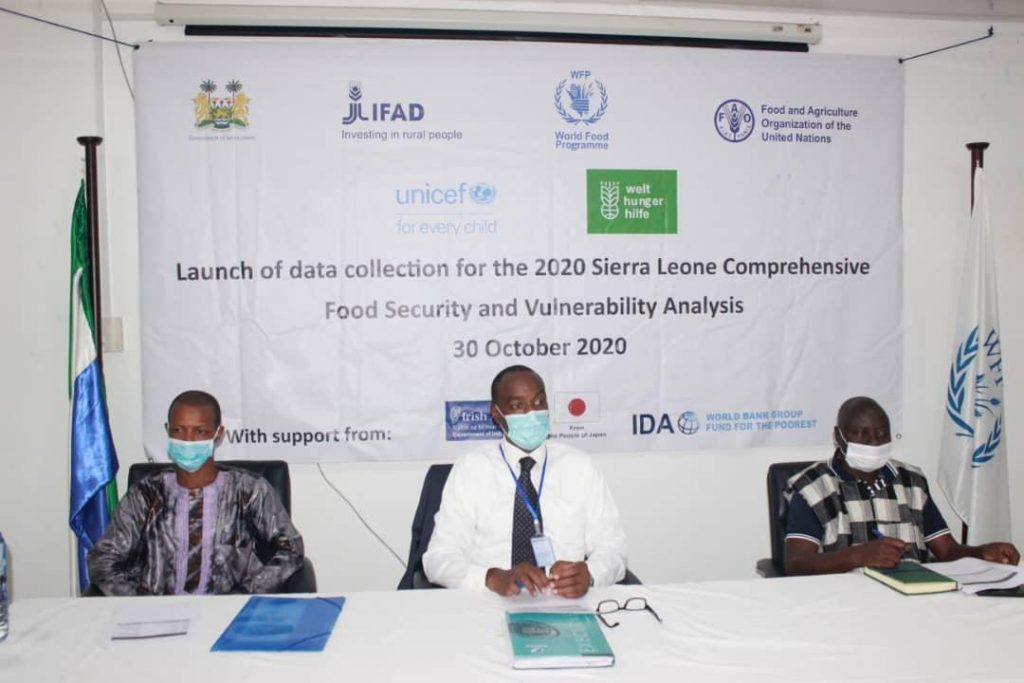
In collaboration with the Ministry of Agriculture and Forestry (MAF), WFP leads the countrywide vulnerability assessment and mapping survey which takes place every 5 years. The previous ones took place in 2010 and 2015.
“As we officially commence the data collection process, we look forward to receiving, with help from statistics Sierra Leone, a clean, credible data and an analysis that will be used by the government and development partners for planning ,targeting and initiating programs that assist the most vulnerable,” said Mr. Steve Nsubuga, Country Director of the World Food Programme.
He made this statement made on Friday 30 October 2020 in Port Loko to mark the launch of the data collection for the 2020 Comprehensive Food Security and vulnerability Analysis (CFSVA).
Unlike the Food Security Monitoring System which provides a quick assessment at the district level every lean season and post-harvest season, the CFSVA collects data at the Chiefdom level and thus provides a more in-depth analysis.
Speaking on behalf of the honorable Minister of Agriculture and Forestry, Dr, Abu Bakarr Karim ,the Director of Project, Evaluation, Monitoring and Statistics Division, Dr. Ajuba Sheriff thanked Irish Aid, Japan, the World Bank, UNICEF, FAO, IFAD, and Welthungerhilfe for providing the funds and making it possible to conduct such an important assessment.
Dr. Sulaiman Sowe representing the Embassy of Ireland, revealed said that the CFSVA is the latest project funded by Irish Aid in addition to the Moderate Acute Malnutrition treatment programme for children 6-59 months, pregnant and lactating women and adolescent girls.

“Ireland’s overarching priority is to ensure that our development programmes contribute to reducing the incidence and mitigating the impact of the pandemic among vulnerable populations in line with the commitment to reaching the furthest behind first,” he said.
This four week- long survey will target 35,000 households (approximately 175,000 people) to analyze the food security and vulnerability status situations at the national, district and chiefdom levels. The goal is to provide timely and relevant data that will support stakeholders including the government, UN, development partners and civil society organizations to target and design fitting programmes for support the most vulnerable areas or populations.
The results of this survey will also serve as a baseline for WFP’s Country Strategic Planning (2020-2024), the United Nations Sustainable Development Cooperation Framework (UNSDCF)2020-2023, the Government’s Mid-Term National Development Plan (2019-2023), as well as the COVID19 recovery plan.
Furthermore, the CFSVA will shed light on the impact of COVID-19 on the food security and livelihoods of the population, and the resulting analysis will inform the design and implementation of response programs.
The CFSVA will also identify the most food insecure; who they are; where they are; and how many. The results of this survey will serve as a baseline for WFP’s Country Strategic Planning (2020-2024), the United Nations Sustainable Development Cooperation Framework (UNSDCF)2020-2023, the Government’s Mid-Term National Development Plan (2019-2023), as well as the COVID19 recovery plan.
Lastly, nutrition indicators will be included in the CFSVA will cover the nutrition situation using the Mid Upper Arm Circumference methodology to provide some good relevant insights on the nutrition situation given the lack of latest data on malnutrition since 2017.



